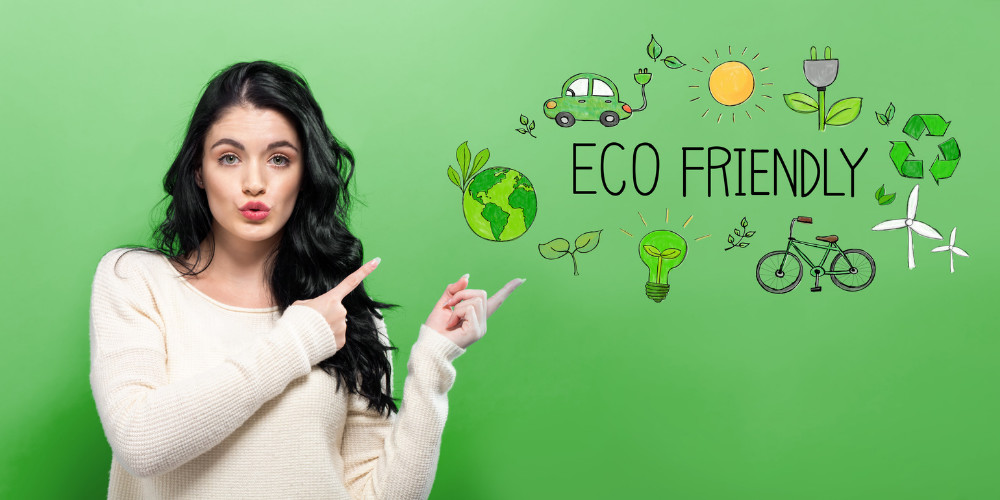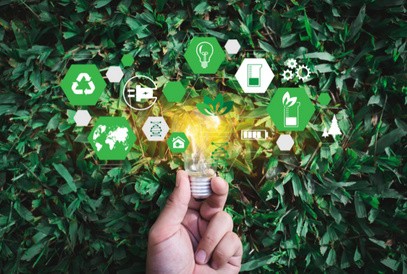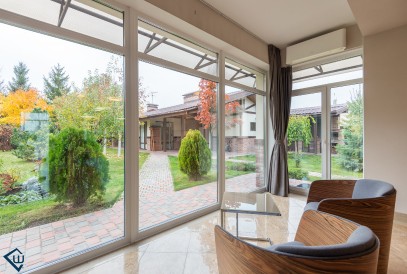Eco friendly: what does it mean? Find out what it means to be eco-friendly and how to adopt sustainable behaviours.
Today I want to talk about a very important and topical topic: eco-friendly. But
what exactly does eco-friendly mean? It is an English term that indicates
everything that is environmentally friendly , i.e. everything that preserves nature and reduces the impact on the ecosystem.
Being eco-friendly doesn't just mean recycling or using biodegradable products, but it implies a real
change of mentality . It means ensuring that our daily actions are aware of and oriented towards environmental protection.
How to become eco green: what are the activities and behaviors to follow?
Being eco friendly means much more than simply adopting some ecological practices. It is a lifestyle, a philosophy based on awareness and responsibility towards the environment that surrounds us. Each of us can make a difference with small daily gestures, helping to preserve our planet for future generations.
- First of all, one of the first things to do to be eco friendly is to reduce energy consumption . We can start by simply turning off the lights when they are not needed or by not leaving appliances on standby. Furthermore, we can opt for the use of renewable energy sources such as solar or wind power, thus helping to reduce harmful emissions into the atmosphere;
- Another fundamental aspect to be eco friendly concerns sustainable mobility . We may prefer means of transport with a low environmental impact such as the bicycle or public transport instead of the private car. In this way we reduce CO2 emissions and promote a healthier lifestyle;
- The choice of the products we use is equally important to be eco friendly. We must favor organic and low environmental impact products, avoiding the use of chemicals harmful to health and the environment. Furthermore, we may prefer products with recyclable packaging or without packaging in order to reduce the production of waste;
- Another habit we can adopt to be eco friendly is saving water . We can make a difference by simply turning off the faucet when we're not using it or installing water-saving devices like low-flow faucets or dual-flush toilets;
- One of the most important activities to become eco green is to plant trees . Trees are essential for our survival: they produce oxygen, absorb carbon dioxide and create habitats for many different species. We can participate in reforestation projects or we can also plant trees in our garden or in the green areas of our city. Every tree counts and can make a difference in tackling climate change;
- Finally, one of the fundamental points to be eco friendly concerns the awareness of the people around us. We have to share our experiences and our knowledge on the importance of living in harmony with the environment, encouraging others to adopt eco-friendly behaviors. We can do this through dialogue, sharing on social media or even by organizing events and activities that promote sustainable development.
"We are the guests of this planet, not its masters." - Marianne Williamson

Eco-friendly: meaning and definition
Being eco-friendly means adopting a lifestyle that respects the environment and is sustainable in the long term. This includes many spheres of our daily life, such as food, mobility, transport, energy, fashion and much more.
Being eco-friendly does not mean giving up comfort or the pleasure of living. It just means adopting conscious choices that take into account the environmental consequences. In this way, we will be able to enjoy a cleaner and healthier planet for ourselves and for future generations.
Why should we care about being eco-friendly?
Our planet is facing an unprecedented ecological crisis, with ongoing climate change, deforestation, water pollution and much more. It is therefore vital that each of us do our part to reverse this situation. We shouldn't think that our individual actions don't matter, because every little gesture counts. We can all make a difference and help create a greener world.
But how can we do? There are many ways to be eco-friendly in our everyday life.
- For example, we can start reducing our meat consumption and opting for a vegetarian or vegan diet. The meat industry is responsible for a large amount of greenhouse gas emissions and is a major driver of climate change.
- Furthermore, we can try to reduce our environmental impact by opting for sustainable means of transport such as cycling or public transport instead of the car. In this way we not only contribute to reducing our CO2 emissions, but we also move in a healthier and more active way.
- Another important aspect of being eco-friendly is the energy we consume. We can try to reduce our energy consumption at home, for example by turning off the lights when not needed or using energy efficient appliances.
- Furthermore, we can also opt for renewable energies such as solar or wind energy to power our home. This will help us reduce our dependence on fossil fuels and help create a more sustainable future.
- Finally, we can also make eco-friendly choices in the fashion industry. For example, we can opt for clothes made from sustainable materials such as organic cotton or hemp instead of synthetic materials that are harmful to the environment.
So next time you make a decision, take a moment to think about how it might affect the environment. Choose the most sustainable option and try to reduce your negative impact.
How to explain sustainability to children?
But how can we
explain sustainability to children in a simple and fun way? Here are some tips to do it!
First of all, we have to explain to the children that
every action we take, even the smallest one, can have an impact on the environment . For example, when we leave the lights on in an empty room or leave the tap running while brushing our teeth, we are wasting precious resources such as energy and water. We must teach them to always turn off the lights when they are not needed and to turn off the faucet while brushing their teeth.
Also, we can explain to them the
importance of recycling . We all know that we have to throw paper in the appropriate bin and organic waste in the compost bin, but how many of you know that there are different types of plastic and that not all of them can be recycled in the same way? We can involve children in recycling and make them superheroes of recycling!
But sustainability isn't just about what we do at home. We can explain to children how some
consumption choices can affect the environment. For example, when we go shopping, we can choose products that have less plastic packaging or are made with recyclable materials. We can also prefer organic products, which do not contain pesticides or substances harmful to the environment.
Finally, we can teach children to
respect nature and animals . We can take them on outdoor trips and let them discover the beauty of nature. We can explain to them that animals and plants need our help to survive and that we must protect them. We can teach them not to throw garbage on the ground and not to waste natural resources.

What is meant by eco-sustainability?
Eco-sustainability is the ability to satisfy the needs of present generations
without compromising the resources and possibilities of future generations.
We live in a world where natural resources are depleting faster and faster. The immoderate consumption and indiscriminate exploitation of nature are putting our planet and the future of the next generations at risk. We are responsible for what happens to our environment and we must do something to reverse this trend.
In this sense
, education in eco-sustainability is essential. We need to inform ourselves and others about environmental issues and how we can help solve them. Only through greater awareness can we hope to create a more sustainable world for all.
"The environment is where we live, the world is what we leave to our children." -Lady Bird Johnson
What is meant by environmental sustainability?
Environmental sustainability is a concept that is becoming increasingly important in modern society. In a nutshell, it's about living in harmony with the surrounding environment, making choices that minimize the negative impact on the ecosystem and promote the well-being of the planet. It is a conscious choice that can make a big difference in the world.
As we have already seen, there are many actions we can take to be more eco-friendly in everyday life. For example, we can reduce our energy use by using energy-efficient equipment or by switching to renewable energy sources such as solar energy. We can also save water by avoiding unnecessary waste and installing fixtures such as low-flow faucets.
The water cycle between land, sea and sky: a wonderful balance to be preserved
Here is a theme that concerns us all:
the water cycle between land, sea and sky . This natural process is essential for life on Earth and plays a key role in maintaining the ecological balance of our planet. It is important to understand how this cycle works and how we can help preserve it.
The water cycle begins with evaporation, when heat from the sun evaporates water in rivers, lakes and oceans. The evaporated water turns into water vapor which rises up forming clouds. This process takes place thanks to solar energy and the difference in atmospheric pressure.
Clouds are made up of tiny droplets of water condensed around dust particles in the air. When these droplets become heavy enough, they fall as rain, snow, or hail. This phenomenon is known as precipitation and is essential for the supply of fresh water on Earth.
Part of the precipitation is absorbed by the soil and plants, feeding rivers and lakes. This water is then returned to the atmosphere through a process called plant evaporation or transpiration. Plants absorb water from the soil through their roots and carry it up to their leaves, where it is released into the air in the form of water vapour.
Another part of the precipitation flows along land surfaces forming streams which merge into larger and larger rivers. These rivers flow into the ocean, thus completing the water cycle. The water in the oceans, in turn, is evaporated by the sun, starting a new cycle.
It is imperative that we understand the importance of this cycle to life on Earth and do our part to preserve it. This means
adopting eco-friendly practices that reduce water pollution and promote the conservation of water resources.
Here are some tips to help conserve the water cycle:
- Reduce water use : Shorten the duration of showers, fix water leaks, use water wisely, and collect rainwater to water plants.
- Use eco-friendly products : avoid using chemicals that are harmful to the environment such as detergents and herbicides. Opt for biodegradable and environmentally friendly alternatives.
- Reduce water pollution : Avoid throwing toxic substances down sinks or toilets. Make sure you dispose of chemicals and hazardous substances properly.
- Support the conservation of aquatic habitats : participate in beach, river and lake cleanup initiatives. Help keep aquatic habitats free from waste and pollution.
- Promote awareness - Share information about the water cycle with friends, family and colleagues. Educate others about the importance of preserving this wonderful natural balance.
Let us always remember that every drop of water plays an important role in this extraordinary cycle involving land, sea and sky. We must work together to protect this wonderful balance and ensure a sustainable future for our planet!
What does eco-sustainable development mean?
Eco-sustainable development is a concept based on the need to find a
balance between economic development and environmental conservation . It means creating a better future, where our actions do not harm the planet, but instead preserve it for future generations.
The objective of eco-sustainable development is to satisfy the needs of the present without compromising the ability of future generations to satisfy their own needs. This implies the conscious and responsible use of natural resources, avoiding the excessive exploitation and destruction of ecosystems.
Organic Farming: the Sustainable Future We Can Grow
Organic farming is a cultivation method based on the use of natural substances to fertilize the soil and protect plants from parasites. In organic farming, no chemical pesticides or synthetic fertilizers are used, but the use of organic compost, manure and other natural substances is preferred.
What are the advantages of organic farming? First of all, this agricultural practice
promotes biodiversity . By using natural methods to protect crops, the presence of beneficial insects is encouraged and the risk of negative impact on the environment is reduced. Furthermore, organic farming contributes to safeguarding the quality of the soil, avoiding the use of harmful chemicals that could damage it in the long term.
But that's not all! Organic farming also has a
positive impact on our health . Organic products are free from pesticide residues and harmful chemicals, making them safer for us and for future generations. Furthermore, organic crops contain higher amounts of vitamins, minerals and antioxidants than conventional ones, thanks to the higher fertility of the soil.
Fight against waste
The
fight against waste is a global movement that aims to reduce consumption and promote sustainable practices. It's a commitment that may seem challenging, but it's actually much easier than you might think. Just open your eyes and take baby steps in the right direction.
One of the most effective ways to combat waste is
to reduce the consumption of single-use plastics . Items like water bottles, grocery bags, and plastic cutlery are among our planet's biggest polluters. Choosing reusable alternatives, like stainless steel water bottles or canvas grocery bags, can make a big difference.
Also, let's not forget about the food.
Food waste is a huge problem: tons of still edible food are thrown away every year. To combat this waste, we can do our part by planning meals in advance and using everything we have in the refrigerator before it spoils. Furthermore, we can also consider the idea of composting food waste to further reduce the environmental impact.
Another eco-friendly practice that we can adopt is to
buy second-hand products . Objects such as furniture, clothing and toys can have a second life if we buy them from charity shops or participate in flea markets. This way we will not only save money, but we will also reduce the environmental impact of producing new items.
Finally, we can't overlook the
power of sharing . Now more than ever, we have the ability to share things we don't use often with friends, family, or neighbors. By doing this, we will not only reduce waste, but also create stronger bonds in our community.
Use of natural and recycled materials
We live in an era in which our attention to the environment is increasingly high, and we realize the importance of making conscious choices to reduce the negative impact on the Earth. One of the ways forward is certainly to use natural and recycled materials, which allow us not only to limit the use of non-renewable resources, but also to enhance what already exists.
Let's start with natural materials. Today there are numerous eco-friendly alternatives to traditional synthetic materials.
For example, we can opt for
wooden floors from sustainably managed forests. This choice not only gives warmth and elegance to the rooms, but also reduces the emission of harmful substances into the air. Furthermore, wood is a renewable and biodegradable material, which means that once it reaches the end of its life cycle, it can be easily disposed of without harming the environment.
Another very interesting natural material is
cork . Thanks to its insulating properties, cork can be used to cover walls and ceilings, helping to keep the room temperature stable and thus reducing energy consumption. Furthermore, cork is a recyclable and fully biodegradable material, making it a truly eco-friendly choice.
Now let's move on to
recycled materials . Recycling and reusing disused objects and materials is a smart way to reduce waste production and give new life to what seemed destined to be thrown away. For example, old doors can be transformed into tables or shelves, old pallets can become a
pallet sofa, and glass bottles can be repurposed as vases or lamps. The possibilities are endless!
Furthermore, the use of natural and recycled materials is also a way to support the local economy. Often, these materials are produced by small businesses or local artisans, who work in a sustainable way and with respect for nature. Choosing to use their products therefore means supporting local communities and promoting more equitable and responsible economic development.
What is meant by greenwashing?
Simply put, greenwashing refers to those instances where a company or organization presents itself as green and sustainable, but in reality it is not at all. Often this is just a
marketing strategy to attract environmentally conscious customers and make them believe they are making an eco-friendly choice.
But why should we care? The answer is simple: greenwashing can mislead consumers into making choices that aren't really environmentally sustainable. For example, you might buy a product that is advertised as "green" or "eco-friendly," but actually has only a minimal reduction in environmental impact compared to other alternatives.
The main problem with greenwashing is that
it destroys consumers' trust in ecology and sustainability. When people find out they've been duped by a company that claims to be green, they become more skeptical of any company that makes similar claims. This
undermines progress towards a truly eco-friendly society.
We consumers have to be critical and ask companies questions. If a company is unable to provide clear and transparent answers, it is probably a sign that they are trying to hide something from us.





